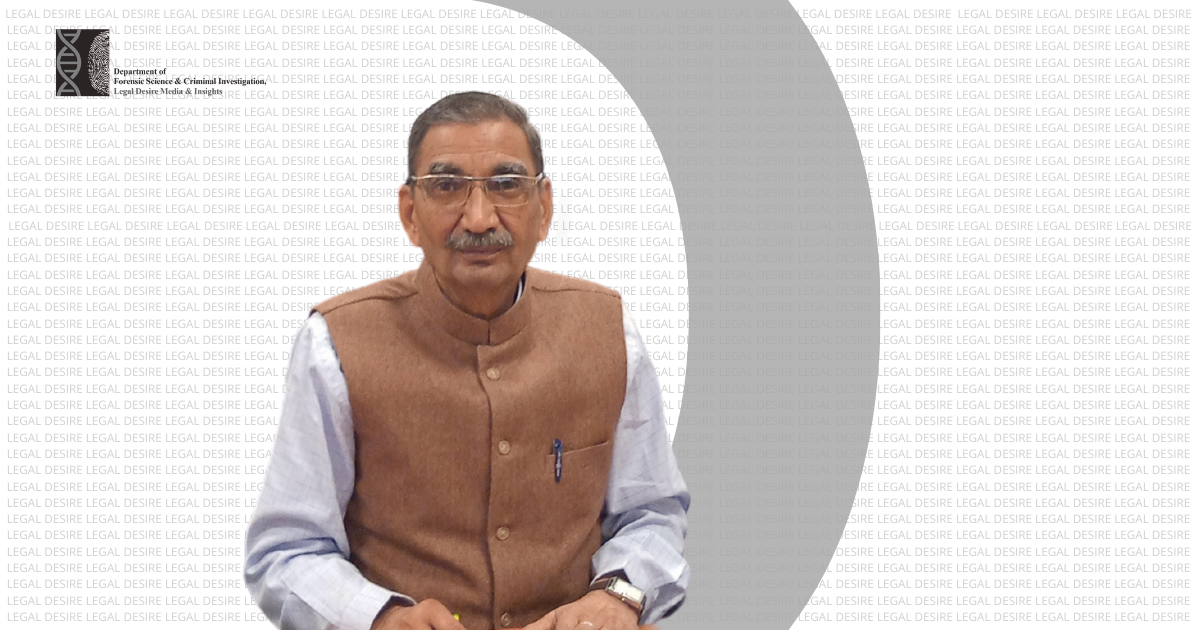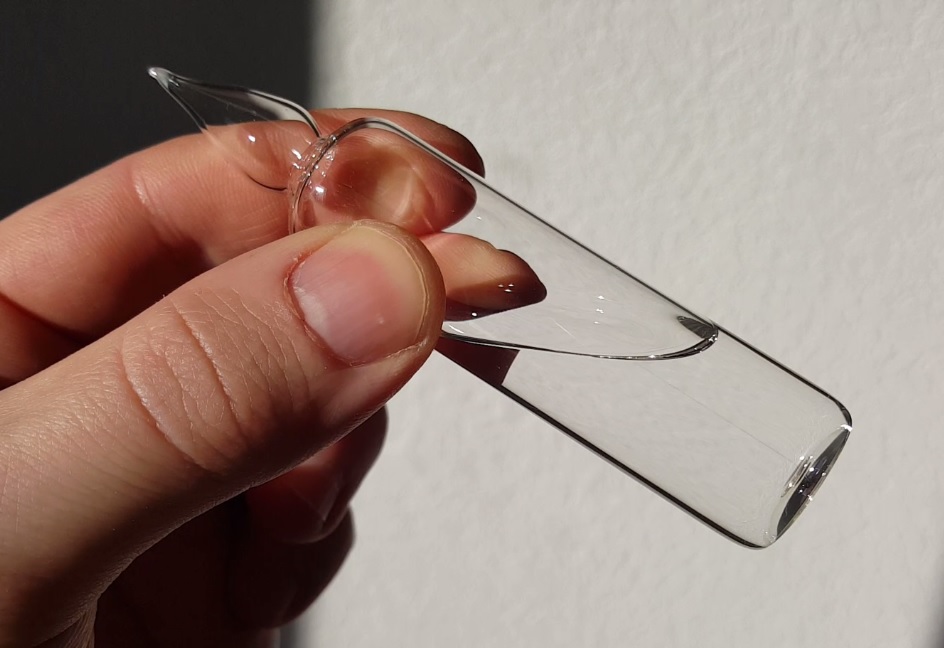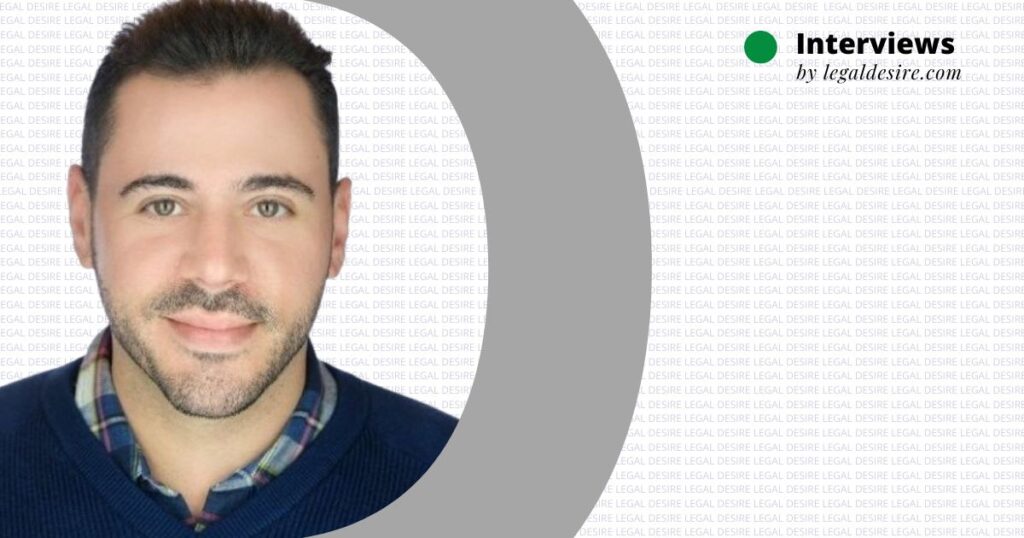Now Reading: In Conversation with Dr. J.R. Gaur, Director, School of Forensic Science and Risk Management [SFSRM], Rashtriya Raksha University [RRU]
-
01
In Conversation with Dr. J.R. Gaur, Director, School of Forensic Science and Risk Management [SFSRM], Rashtriya Raksha University [RRU]

In Conversation with Dr. J.R. Gaur, Director, School of Forensic Science and Risk Management [SFSRM], Rashtriya Raksha University [RRU]
Dr. J.R. Gaur is the Director of School of Forensic Science and Risk Management [SFSRM], Rashtriya Raksha University [RRU], Dahegam, Gandhinagar, Gujarat, India & Former Director and Head of State Forensic Science Laboratory, Himachal Pradesh, Junga, India. He has obtained Master of Science degree in Physical Anthropology & Ph.D. in Human Genetics and Forensic Serology.
Dr. J.R. Gaur worked at the State Forensic Science Laboratory, Haryana, Madhuban, Karnal as Scientific Assistant (Serology) initially. After that he was subsequently selected to head the State Forensic Science Laboratory, Himachal Pradesh as Assistant Director (Biology & Serology), Deputy Director & Director in the same laboratory till 2012. He also worked with Bureau of Police Research and Development [BPR&D], MHA Gol, New Delhi as Principal Scientific officer (Life Sciences). He is a well-known Forensic Scientist in India and abroad.
During his tenure of service Dr. Gaur examined and reported about 13,000 crime cases in the laboratory and he has examined about 650 scenes of crime. He also appeared for evidences in various Courts of Law in India in about 262 cases. He has been researching and writing scientific papers in Forensic Sciences ever since his induction in this field. He has about 150 publications to his credit in National as well as International journals of repute. Not only this, for the education of the public and all the wings of Criminal Justice System he has given 32 Radio Talks from All India Radio, Shimla on Forensic Sciences and allied subjects and also got telecasted six T.V. talk on Forensic Science from Door darshan, Shimla. Dr. Gaur has also written 8 books/booklets on Forensic Sciences.
On 13 occasions, Dr. Gaur has been given letters of appreciation by his seniors in the State Government for his excellent and meritorious performance in Forensic works. He has been a thorough and meticulous examiner of scientific evidences. He has worked in the fields of Forensic Anthropology, Forensic Biology, Forensic Serology and Scene of Crime examinations during his service and solved a number of ticklish cases in the country.
Interview:
- What inspired you to join the forensic domain during those early days, when there wasn’t much awareness about forensics?
It is true that when I joined Forensics in the year 1978 at the Forensic Science Laboratory, Haryana, Madhuban (Karnal), India, there was not much awareness about forensics in India. It was by chance that I entered into this domain or in other words; I can say it was my destiny which brought me to this field. After having passed my MSc in Anthropology (Physical), I was working with Panjab University (Anthropology Department) as a Junior Research Fellow in the year 1977, in a project of Anthropological Survey of India. One day, one of my professors asked me, why should I not try for a job at the Forensic Science Laboratory in Haryana. I said sir, I don’t know if there is any Forensic Laboratory in Haryana.
In the meantime, after a few days, I got an interview letter from the regional employment exchange, Chandigarh for the post of Scientific Assistant (Serology). I appeared for the interview at FSL Haryana, Madhuban and was selected. I was the only eligible candidate for the seven vacant posts. Moreover, academically I was very sound and I have secured second position in the MSc batch in the university.
- You were the key person that had the responsibility of capacity building of forensic labs in Himachal Pradesh. What challenges were faced by you while handling it and how did you manage to do all of it, while dealing with the casework at the same time?
I proceeded to Himachal Pradesh Forensic Science Laboratory on deputation from Haryana as Assistant Director (Biology and Serology) on 2nd of April, 1990. The Laboratory was initially established in the Police Barracks modified into Laboratories at Police Complex Bharari, Shimla. There was a skeleton staff consisting of one Assistant Director, two Scientific Officers, three Scientific Assistants, and four Lab Attendants. The Director was re-employed after retirement; who also left us at the beginning of 1993. We were running four divisions Biology & Serology, Chemistry & Toxicology, Document & Photography and Physics and Ballistics with this staff. Besides, we had to examine scenes of crime all over the state of Himachal Pradesh and also had to impart training to police on different forensic aspects.
I had to run from pillar to post in the government to get funds for creating infrastructure and for getting additional staff, which was given by the government from time to time. It was very difficult to convince the officers in the government on the Scientific aspects but I was successful in doing so. We had kept targets in the timeline for doing every work. No case report was kept pending beyond one week. So, there was no backlog. Our whole of the staff worked very dedicatedly. I got established one State Forensic Science Laboratory at Junga and two Regional Forensic Science Labs at Mandi and Dharamsala.
- Being closely associated with academics and teaching process in various colleges and universities, the police personal, police and judicial academy and evaluating UG, PG, PGD and even PG and Ph.D. thesis during your course of service, how different was it, in comparison to doing casework in the lab?
Yes, teaching, training, and evaluation in various academic courses are different from casework. In case work, everything is practical, you have to carry out experiments; you have to perform tests on various exhibits as per SOPs in the manuals. But both works are intertwined and beneficial to each other, as for any examination in forensics you need to keep yourself academically updated with the latest developments, which helps you in the court testimony. While teaching Forensics to Police and Judiciary one comes to know their difficulties and requirements which helps one to carry out future innovations.
- In times, when the phones and television were still luxury things and were not accessible to all, unlike now, you worked on a different but effective initiative to promote and impart awareness about forensic science among the common man via the radio talks. How did this come to your mind? Were the people excited to know about the forensic domain back then?
It came to my mind that radio was the communication medium available to most of the people in the society, whether they are in cities or the interior villages of the hill state of Himachal Pradesh, for the education of Police, Prosecution, Judiciary, Medical Officers and Defence Lawyers also in Forensics. I thought radio to be the best source as they also listened to the radio regularly. Moreover, communication through radio transmission was the most common and cheapest method of imparting education for the protection of the scene of crime. So, I did it. The people were so interested to know about Forensics that they requested the radio staff in various programs to broadcast the Forensic talks on various subjects. These programs created Forensic awareness in all the wings of the criminal justice system and the public at large. I remember in some cases public demanded the Forensic team at the scene of the crime and stated that they will permit police to enter the scene on the arrival of the forensic team. Thus, these talks generated public faith in forensics.
- What challenges were encountered while dealing and processing the evidence submitted to the forensic lab by the police and various other government agencies during the early days when awareness about forensics was not much in the country?
Unsealed, putrefied, deteriorated exhibits came to the lab for want of knowledge of lifting, preservation, packing, and forwarding of the samples/exhibits. This caused a delay in examination and led to inconclusive reports. The cases had to be referred back to the forwarding agencies with the advice to do the needful so that the chain of custody is maintained, to seal the exhibits, and provide attested sample seals for comparison with the seals affixed on the parcels.
- There might have been various instances when you were called for inspecting the crime scene by the IO/Police unit. How challenging was it to deal with it apart from the lab work?
I have successfully examined and reported about 650 crime scenes in my service. The work is challenging but very interesting. The success or failure of the investigation of a case starts from the scene of a crime. If the scene of crime has been examined meticulously and recorded in situ, it gives us every information like the motive behind the crime, time of the commission of the crime, point of entry and exit, number of accused, and type of weapons used, the identity of the victim and the accused, etc. The scenes of crime sometimes used to be in difficult locations/topography, one had to reach the place after walking several kilometers on foot, through the fields, forests, and hills even at the odd hours during night. So, it was entirely different from lab work.
- After the lab examination of the case evidences, you might have been called in the court of law on many instances to testify about the particular case either from the Prosecutor/Defendant side. What challenges were encountered by you while giving your opinion in the court where the people lacked the scientific understanding about the forensics?
Yes, I have appeared in the courts for testimony in about 250 cases during my service. It is true that people don’t understand scientific jugglery in the courts of law. If the report has been given in the simple language then there is no problem. But you can’t omit every scientific word from the report, such terms have to be explained in the court. One must be thorough with the case file, case report, and the subject while giving testimony in the court of law One must avoid hypothetical questions, if it has to be replied, one should be tactful enough. Avoid answering in yes or no, if asked, must elaborate after answering in yes or no. It is rightly said, “Court is not a place of lively music.”
- Many trainings are being undertaken by the Directorate of Forensic Science Services (DFSS), New Delhi. How effective is it while working at the lab or crime scenes?
Trainings are the backbone of any professional in any department including forensics. These are highly effective for working in the lab and at the scenes of crime. The training should always be theoretical followed by practical to make these more fruitful.
- Most of the professionals working at various FSLs are overburdened by the casework. But you managed to indulge in research work despite all this. How did you make it possible and what challenges did you encounter while doing so?
Yes, it is true most professionals working in FSLs are overburdened with casework as the manpower is not commensurate with the workload. But it does not mean that one should not carry out research work. Casework need based research work is always required in forensics. I used to do it on holidays or by devoting 2 to 3 hours daily before or after office timings and writing, computation and typing work used to be done at home. That is how I followed and carried out research work. My total working hours out 24 hours always had been 12 to 16 hours daily.
10. Do you collaborate on research projects with your colleagues at the lab? In your opinion, how important is it to do so?
Yes, it is very important to involve your colleagues in the research projects to impart them training and know-how of research in a field. It also helps to prepare second in command scientists as future commanders. Moreover, scientific research is a teamwork and give and take of ideas. The teamwork always leads to better completion of various research projects in time.
- Having worked for almost 4 decades in the Forensic Domain, do you still wish to contribute to the domain? How?
Yes, I still wish to contribute to the domain and still I am contributing. I worked in FSL Haryana and Himachal Pradesh for nearly a little above 34 years. After my retirement as Director FSL from H.P. in 2012, I worked in BPR&D, MHA, GOI for nearly three and half years as Principal Scientific Officer (Life Science), till march 2016. Ever since then, I have been teaching forensics in various police judicial and academic institutions as guest or visiting faculty. Now again I have joined as Director, School of Forensic Science and Risk Management at the Rashtriya Raksha University (An Institution of National Importance) at Lavad, Dahegam, Gandhinagar district, Gujarat, India. I am teaching postgraduate students and researchers online at present and shall further carry out research in those forensic fields which are unexplored or little-explored till now.
- Contributing to the Forensic Field from all these years How has your work been recognized in the community?
My work has been recognized as it has been published in National and International Journals of repute and has been cited very widely. I have received appreciation letters on 13 occasions from the Himachal Judiciary, Police and the government of Himachal Pradesh.
Moreover, I have been honored by the Chief Minister of Haryana in January 2004 in the 15th All India Forensic Science Conference at Karnal for providing best Forensic Science Services to the society. I also received Union Home Minister’s award for meritorious services in Biological Sciences in 1998, Forensic Science Excellence Award of the Union Home Ministry in 2003, Pandit Gobind Vallabh Pant Puruskar of BPR&D, MHA, GoI in 2006, Bharat Gaurav Award of India International friendship Society in 2016 and last but not the least I received Union Home Ministers Lifetime Achievement Award 2018 for Outstanding achievements and contributions in the field of Forensic Sciences.
The interview was published in Forensic Reporter January 2021 Issue.





![In Conversation with Dr. Rajesh Verma, Deputy Director, Regional Forensic Science Laboratory [RFSL], Mandi, Himachal Pradesh, India](https://legaldesire.com/wp-content/uploads/2021/04/featuredimage-5.png)



